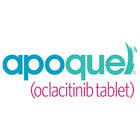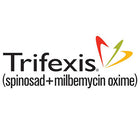Palladia Tablets for Dogs - Mast Cell Tumor Treatment
Palladia Tablets (10mg) are a groundbreaking medication specifically designed to treat mast cell tumors in dogs. As the first FDA-approved targeted therapy for canine cancer, Palladia offers a promising solution by inhibiting the growth of tumor cells.
This medication is vital for pet owners seeking an effective treatment to manage and slow the progression of cancer in their beloved pets, providing hope and improving the quality of life.
Prescription items are NON-RETURNABLE and NON-REFUNDABLE.
Benefits of Palladia Tablets for Dogs
- Targeted Cancer Therapy: Unlike traditional chemotherapy, Palladia specifically targets cancer cells, reducing the impact on healthy cells and minimizing side effects.
- FDA-Approved: Palladia is the first drug approved by the FDA for treating canine mast cell tumors, ensuring it meets stringent safety and efficacy standards.
- Improved Quality of Life: By slowing tumor growth and reducing tumor size, Palladia helps improve your dog’s comfort and prolongs survival time.
Subscription and Purchase Information
Buying Options and Discounts: Purchase Palladia Tablets in a convenient 1, 2, 3, and 6-month supply pack. Subscribe for regular shipments to ensure you never miss a dose and enjoy discounts on your purchases.
Order online for hassle-free delivery to your doorstep.
Ingredients in Palladia Tablets
Palladia Tablets contain the active ingredient Toceranib Phosphate, a tyrosine kinase inhibitor that interferes with the growth and spread of cancer cells.
How It Works
Palladia works by inhibiting the activity of tyrosine kinases, proteins that play a critical role in the growth and spread of cancer cells. By blocking these proteins, Palladia disrupts the signaling pathways that tumors rely on to grow, effectively slowing or halting their progression. This targeted approach allows Palladia to attack cancer cells more precisely while sparing healthy cells, leading to fewer side effects compared to traditional chemotherapy.
Recommended Dosage and Administration
Use as directed by your veterinarian.
Administer an initial dosage of 3.25 mg/kg (1.48 mg/lb) of body weight, every other day. Dose reductions of 0.5 mg/kg every other day and dose interruptions (skipping your dose for up to 2 weeks) may be utilized, if needed, to manage adverse reaction at the discretion of your veterinarian. Adjust dose based on weekly veterinary checks for the first 6 weeks and approximately every 6 weeks. Palladia may be administered with or without food. Do not split tablets.
Human Warnings
NOT FOR USE IN HUMANS. KEEP THIS AND ALL MEDICATIONS OUT OF THE REACH OF
CHILDREN. Children should not come in contact with PALLADIA. Keep children away from feces, urine, or vomit of treated dogs. To avoid exposure to drug, wash hands with soap and water after administering PALLADIA and wear protective gloves to prevent direct contact with feces, urine, vomit, and broken or moistened PALLADIA tablets. Place all waste materials in a plastic bag and seal before general disposal.
Side Effects of Palladia tablets for Dogs
Precautions
Common side effects of Palladia include vomiting, diarrhea, and loss of appetite. It’s important to monitor your dog closely during treatment and report any adverse effects to your veterinarian immediately.
Warnings
Palladia should not be used in dogs with severe liver or kidney impairment. Additionally, pregnant or nursing dogs should not be treated with Palladia due to potential risks to the puppies.
Contraindications
Palladia is contraindicated in dogs with known hypersensitivity to Toceranib Phosphate. Use caution when administering Palladia to dogs with pre-existing conditions, and always consult your veterinarian before starting treatment.
Storage
Store Palladia Tablets at room temperature, away from moisture and heat. Keep the medication out of reach of children and pets. Proper storage ensures the medication remains effective throughout its shelf life.
Shipping & Returns
Shipping Policy: We offer all types of shipping options (Ground, Express, Priority, International) depending on the urgency of the product requirements. To know about our shipping policy in detail, click here.
Refund policy: If you face any issue with our product and want to return it, read our refund policy carefully.
Top 10 FAQs - Palladia for Dogs Tumor Treatment
Q: What is Palladia Tablets for Dogs used for?
A: Palladia Tablets are primarily used to treat mast cell tumors in dogs. They work as a targeted therapy that inhibits the growth and spread of cancer cells, making them an effective option for managing specific types of canine cancer.
Q: How long does it take for Palladia to show results in dogs?
A: Results from Palladia treatment can typically be seen within 2-8 weeks. The exact timeline depends on factors like tumor type, stage, and your dog’s overall health. Regular veterinary check-ups are essential to monitor progress.
Q: Can Palladia be used with other cancer treatments?
A: Palladia may be used alongside other treatments like surgery or radiation, depending on the veterinarian’s recommendations. It’s important to discuss all medications your dog is taking to avoid potential drug interactions.
Q: What should I do if my dog misses a dose of Palladia?
A: If your dog misses a dose, give it as soon as you remember. If it’s close to the next scheduled dose, skip the missed dose—do not double up. Always consult your veterinarian for specific guidance.
Q: Is Palladia safe for long-term use?
A: Palladia can be used long-term under veterinary supervision. Regular blood tests and monitoring are necessary to manage any side effects and ensure the treatment remains effective.
Q: How should I handle Palladia tablets safely?
A: Wear gloves when handling Palladia tablets to avoid skin contact, as the medication can be absorbed through the skin. Wash your hands thoroughly after handling the tablets.
Q: Can Palladia be used in small dog breeds?
A: Yes, Palladia can be used in small breeds, but the dosage may need adjustment. Your veterinarian will calculate the correct dose based on your dog’s weight and overall health.
Q: What should I feed my dog while on Palladia?
A: A balanced, easily digestible diet is recommended while your dog is on Palladia. Consult your veterinarian for specific dietary recommendations tailored to your dog’s needs.
Q: Can Palladia cause weight loss in dogs?
A: Yes, weight loss can occur as a side effect of Palladia, often due to decreased appetite or gastrointestinal issues. Regular monitoring and dietary adjustments can help manage this.
Q: What signs indicate that Palladia is not working?
A: Signs that Palladia may not be working include the continued growth of the tumor, worsening symptoms, or new tumors appearing. If you notice any of these signs, consult your veterinarian promptly.
Clinical Research:
https://onlinelibrary.wiley.com/doi/abs/10.1111/j.1476-5829.2011.00261.x
Recommended for the Palladia Tablets for Dogs (Toceranib Phosphate) 10mg, 30 tablets
Product title
Vendor
£19.99 | £24.99
Product title
Vendor
£19.99 | £24.99
Product title
Vendor
£19.99 | £24.99
Product title
Vendor










